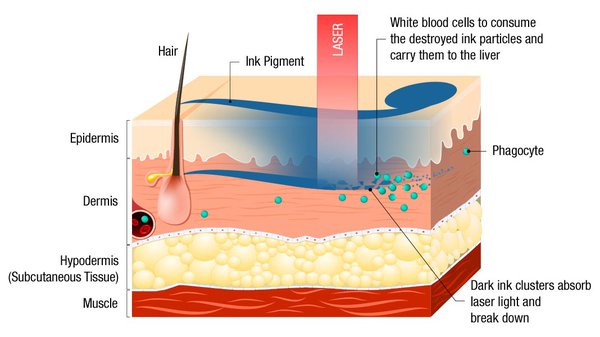Tattoos and permanent makeup have become popular throughout the years. However, the look or design does not always stand the test of time...
The Tattooing Process
The tattooing process causes damage to the top of the dermis. The ink itself is initially dispersed as fine granules in the upper dermis but aggregate into more concentrated areas at 7-13 days.
According to a 2021 study, up to 12% of Americans regret the decision to get at least one of their tattoos.1
Don’t panic if you aren’t happy with the results—tattoo and permanent makeup removal is possible. Before you start your tattoo redo, removal procedures can help to get rid of the old design that you don’t love anymore.
You might wonder how to tattoo removal at home. There are several tattoo removal creams that claim to help decrease the appearance of unwanted tattoos with bleaching or peeling action. However, these products are not recommended by dermatologists.2
The tattoo removal cream uses peeling agents like glycolic acid or trichloracetic acid (TCA). Although TCA can be used in-office by healthcare professionals for certain procedures like chemical peels and wart removal, the U.S. Food & Drug Administration (FDA) does not regulate over-the-counter TCA products on the market.3
Tattoo ink is deposited deep into the second layer of skin called the dermis, peeling agents used in tattoo removal creams cannot penetrate this deep—they can only reach the outer epidermis layer of skin. Depending on skin type and ink color, peeling away the outer layer of skin may decrease the appearance of some tattoos, but it does not remove them.
As you can imagine, creams that work by peeling off the outer layers of skin can have some serious side effects, like burning and scarring. These creams should never be used on sensitive areas like the face.3
Tattoos are meant to be permanent. Tattoo ink is deposited in the second layer of skin, so removal is not an easy procedure. Tattoo removal methods include scraping off the top layers of skin, called dermabrasion, and surgery to cut out the tattoo. The non-invasive method is laser tattoo removal.3
Laser tattoo removal takes time and patience. Depending on the size and ink color of the tattoo, most people will need six to ten treatments to achieve their desired outcome, with a few weeks of healing time between procedures.
Tattoo removal machine likes the Candela PicoWay® utilizes unique picosecond laser technology, delivers ultra-short pulses of high-intensity laser energy to the targeted ink. This ultra-fast delivery of concentrated high-power energy breaks up and shatters the targeted ink clusters into tiny ink particles, but leaves the outer layer of the skin intact. The tiny ink particles are naturally removed by the body.3 The ultra-fast and ultra-short pulse means less discomfort during the treatment.

PicoWay is FDA, CE, and TGA cleared for the removal of a wide range of tattoo colors on different skin types from light to dark skin tone. The PicoWay tattoo removal gives remarkable results in few treatments.
Most private insurance carriers consider tattoo removal a cosmetic, elective procedure and do not cover the cost. The procedure may be covered if your insurance considers it medically necessary due to an infection or other complication.4
When laser tattoo removal is done by a qualified professional, there are few side effects. Immediately after the procedure, you may experience pain, blistering, or crusting. Long-term complications are rare but include skin discoloration, scarring, and allergic reactions.5
Pain depends on your threshold for pain and the location of the tattoo. In general, if you had the strength to get the tattoo, the removal will not be more painful.6
The short answer is no, they do not work. They can also cause serious side effects like burning and scarring, and they are not approved by the FDA.7
Lasers break up the tattoo ink into smaller particles that your body gets rid of. Your body needs time to take care of the ink particles.4
Laser tattoo removal cost varies by provider. Treatment cost will vary depending on the type of tattoo, size of treatment area, number of treatment sessions and other factors. You can look for a PicoWay tattoo removal provider and ask for a consultation.